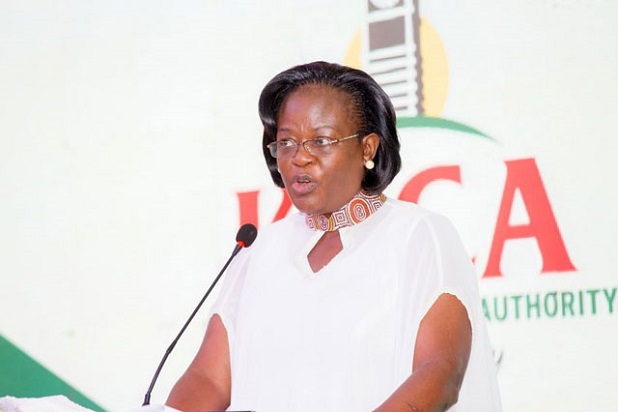Uganda’s top companies are being dominated by men, leaving many women playing peripheral roles.
Keith Kalyegira, the Chief Executive Officer at Capital Markets Authority says that the number of women in the boards of the listed companies is disproportionately lower than that of men
“Uganda clays has 3 women out of 10 board members, BAT has 1 woman out of 8 board members, Bank of Baroda has no women representative on the board, New Vision has 3 women out of 11 where the chairperson is a woman, Umeme has 2women out of 11 board members while, DFCU 1has out of 6 board members,” Kalyegira said.
He made the remarks during the “Ring the Bell” for gender equality ceremony held at Protea Hotel on Tuesday. Held under the theme “Women’s Role in Finance and Investment”, the forum aimed at highlighting how women in Uganda can join the finance sector. The event was supported by a global partnership between the Sustainable Stock Exchanges (SSE) initiative, UN Global Compact, IFC, UN Women, Women in EFT’s and the World Federation of Stock Exchanges.
Noteworthy, in celebration of the International Women’s Day, Uganda Securities Exchange joined 65 other Stock Exchanges globally to ring the bell in a bid to advocate for gender equality in the sector.
The “Ring the Bell” for gender equality ceremony is aimed at highlighting the steps that the sector is taking in advancing gender equality in the workplace, marketplace and within the community.
Kalyegira appealed to the listed companies to pay attention to gender inclusivity and include women on their boards on merit
He also pointed out that there are only 3 women Chief Financial Officer’s out of 20 in the local financial institutions and only 3 CEO’s of financial institutions out of the 24 licensed banks.
According to USE CEO Paul Bwiso, the ring the bell for gender inclusion forum is aimed at promoting women’s needs and goals in the financial markets,
“We have to take a deliberate effort to ensure gender inclusion, the policies we pass with our policy makers that is the CMA,” noted Bwiso.
“We not only have to pass reporting regulations and requirements for gender inclusion, we will need to introduce products that women would be interested in such as for the rural women so that they also invest in the stock exchange.”
According to Bwiso, the USE gender inclusion stands at 48% women and 52% men. However, the board only has a 13% women representation which account for only one woman on the board.
“We will work towards improving that as an objective,” Bwiso said.
“We do know women save a lot, decisions on investments, savings and expenditure at the family level are done by women so based on this if we promote women’s needs and requirements we are bake to see more investments into the stock market because it is an avenue for investment and index would move up because of sustained investments that can grow,” noted Bwiso, adding that the bell ringing ceremony creates awareness of the pivotal role the private sector can play in advancing gender equality to achieve the UN’s Sustainable Development Goal 5.
“It is essential for the companies to develop and improve policies on remuneration, gender representation, sexual harassment prevention, family leave and flexible work in order to support both women and men but to also improve terms of employment and champion equal opportunities within the organizations,” he said.
The SSE provides the exchange with a platform to learn and explore how exchanges, in collaboration with investors, regulators, and companies, can enhance corporate transparency – and ultimately performance – on ESG (environmental, social and corporate governance) issues and encourage sustainable investments.
Giving a keynote speech, Jacqueline Musiitwa, the Executive Director at Financial Sector Deepening reechoed gender disparity in Uganda.
“In the capital markets space, despite the provisions of the Capital Markets Authority Code of Corporate Governance, there are still very few women in leadership positions and on Boards of listed companies,” Musiitwa said.
he added: “ On average, there are only one or two women on each board of a listed company, board of the stock exchange and board of the regulator itself. We are still a long way off the promised land.”







I need more information in regard to the success and challanges of women on boards in public and private sector in Uganda.